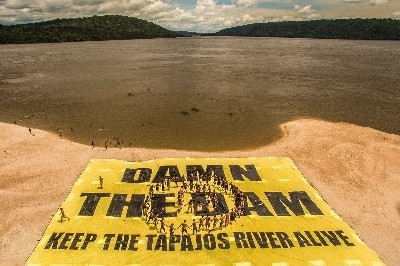Paul McCartney and Ranulph Fiennes back Amazon tribe threatened by dams
Artists, poets, film directors and musicians call on Brazilian government and European companies to recognise the rights of the Munduruku people
Some 48 musicians, poets, chefs, artists, film directors and other celebrities including Sir Paul McCartney, Sir Ranulph Fiennes and Mark Rylance have called on the Brazilian government and European companies to recognise the rights of an Amazonian group whose territory is threatened by a large complex of dams.
In a letter to the Guardian, the group says Brazil’s plan to build four large and many smaller dams on the Tapajós river and its tributaries could destroy thousands of square miles of forest and imperil the Munduruku indigenous people.
A delegation of Munduruku chiefs will arrive in Britain this week to seek a formal meeting with European technology giant Siemens, which has been part of a consortium bidding to win contracts to build the dams.
Chief Arnaldo Kabá Munduruku and his senior adviser will ask Siemens in Britain to publicly state that they will not participate in plans for new dams on their ancestral lands.
The Munduruku have welcomed a decision last week by Brazil’s environment protection agency to reject plans for what would have been one of the world’s largest-ever dams on the river. But they say that the complex of many smaller dams will devastate the forest and their people’s way of life.
“The Brazilian watchdog’s decision marked a turning point in the struggle to protect this corner of the Amazon, but the fight isn’t over yet. The cancelled dam is one of five planned for this highly sensitive area, and the environment agency’s powers to defend the rainforest are now under threat,” the signatories write.
A spokeswoman for Siemens said: “We’re talking with Greenpeace and other stakeholders, and we’re assessing the issues intensively – as we strive to help secure a sustainable, reliable and affordable supply of power for the people of Brazil.
“Should any representatives from the Amazon tribe wish to meet representatives from Siemens while they are in the UK we will welcome them to one of our sites. However Siemens UK is not involved in any hydroelectric power projects in Brazil.”
Greenpeace has been calling on the engineering giant to rule itself out of any further hydroelectric projects in the Amazon rainforest, but the company’s leaders have so far refused to do so.
The group of 48 include Anish Kapoor, Charlotte Church, Grayson Perry, Sir Roger Moore, Michael Palin, Lord David Puttnam and Hugh Fearnley-Whittingstall.
Western celebrities have championed saving Amazonian forests ever since rock star Sting lobbied the president of Brazil in 1989 to stop goldminers decimating the Yanomamai tribe.
Since then, many A-listers including Meryl Streep, Tom Hanks, Sir Elton John, Prince Charles and Bill Clinton have added their voices. In the same period, around 350,000 square kilometres of forest has been destroyed.




